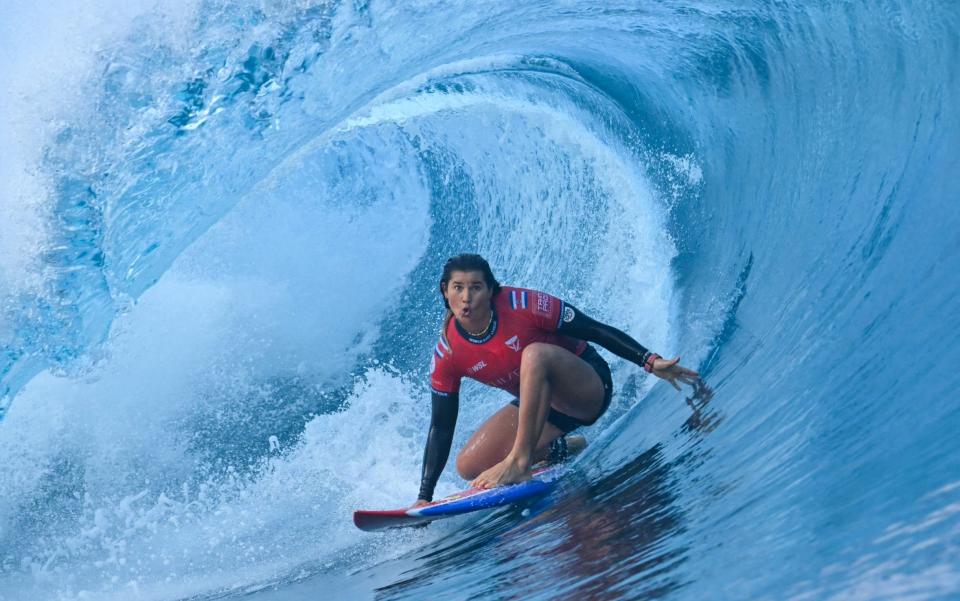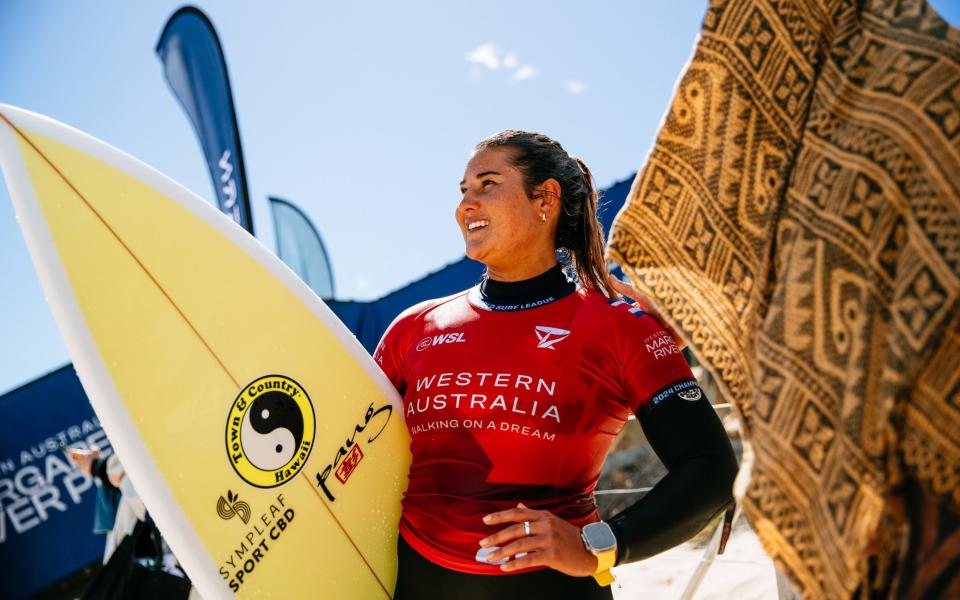Brisa Hennessy: The surfer targeting Olympic gold after tackling brain tumour

“Salt water is in my veins,” says Brisa Hennessy. At three months old, her parents, who ran a surf school, put her on a board for the first time. By the time she was three years old, she was catching her own waves. Now, at 24, she sits third in the Women’s Surf League rankings and is amongst the favourites for Olympic gold.
Yet 18 months ago, her “body was rejecting surfing”. Yes, there was the pressure of competing at the top level but it was more than that. She was experiencing brain fog, fatigue, heart palpitations, muscle weakness, inflammation… At first she was told it was hyperthyroidism, when the thyroid gland produces too many hormones that affect things like heart rate and body temperature, but Hennessy felt it was more significant. An MRI scan proved as much: there was a benign tumour on the pituitary gland at the base of her brain that was basically causing it to malfunction.
“The pituitary gland is the epicentre of everything and that [the tumour] was causing the up-and-down cycle of challenges in my life,” she explains.
Hennessy decided against surgery – “it was invasive and could cause further damage” – and instead has worked to shrink the tumour, through both medication and lifestyle changes. She took five months off the surfing circuit last year and has worked at ways to reduce her stress: breathing exercises, meditation, yoga, listening to music (she is a big fan of The Beatles and reggae).
“I was pushing too hard and in fight-or-flight mode a lot, which caused a lot of stress on my body and that is a big cause of health issues,” she says. “It’s about taking more time for myself and really trying to learn how I can live more at peace with my body and my mind, and how I can complement that with being an athlete. I’m still trying to find my way but at the moment I’m feeling the best I have in a long time. I haven’t had an MRI in quite a long time but because my symptoms have completely subsided my doctor thinks I have shrunk it.
“I didn’t want to surf for a long time. It was so contradicting: how can my happy place, the place that gives me so much peace, be linked to my health issues, my anxiety, my stress? It took time but once I got back into it my body fully reframed what surfing meant to me. Now I know to have that balance: I’m going to have fun but this is my job and I need to be competitive.”
‘When you’re in one of the waves of your life, it’s bigger than a feeling’
With her health much improved, Hennessy is now able to switch focus to the Olympics. She finished joint fifth at Tokyo 2020, when the surfing event took place at Tsurigasaki Beach, more than 60 miles from Tokyo. This year the competition will be even further removed from the host city. Tahiti, the largest island in French Polynesia, is nearly 10,000 miles from Paris but Hennessy cannot wait to return to the reef at Teahupo’o having finished second at last month’s WSL event at the venue – and catching “one of the best waves” of her career there.
“You know you’re in one of the waves of your life when it’s bigger than a feeling, it’s everything. It’s sensory overload, it makes you feel all the things,” she recalls.

“Tahiti is the complete opposite of Japan, which was a beach break with smaller waves. Tahiti is a tropical island, the wave is incredibly dangerous and scary and beautiful. I spent a whole month in Tahiti training, trying to immerse myself in the culture and the wave. It’s one of the most dangerous waves in the world, so it can be very emotionally draining, physically draining, and so rewarding. I feel I had some of the worst wipeouts and worst days of surfing there, but with that the best moments and best waves. It’s so extreme and that’s why we’re doing it – it’s right on that edge of anxiousness and fear. Tahiti brings that constantly.
“Fear is an important part of growing and embracing becoming a surfer. Can I push past this, is this going to make me grow and is this safe? Or is this dangerous? Fear is always there and it is about embracing it. It’s knowing I can’t run from it or hide from it, so it’s using that energy in the right way.”
‘It’s about having gratitude for your body’
If she can harness that energy to make the podium this summer, it will be Costa Rica’s first Olympic medal in more than two decades, the country’s first non-swimming medal and its first not won by the Poll sisters, Silvia and Claudia.
Hennessy spent her formative years in the Central American country, living with her parents in the jungle next to the ocean. They were “fully immersed in nature” and would occasionally find a snake on the dining room table or monkeys in a bedroom as animals made their way into the open structure. Moving to Hawaii aged nine was a shock to the system, switching from a fairly isolated existence to being around more children and people generally. She admits to feeling like “an outsider” and comparing herself to others, which ultimately led to her developing an eating disorder in her mid-teens – one that caused her period to stop for two years.
Last year Hennessy decided to share her struggles with body image in an Instagram post in the hope her experiences would help at least one other person and she is quick to highlight the pressures female surfers face “to look a certain way”.
“In our sport we’re constantly showing our bodies, we’re in swimsuits, it’s a pretty exposed sport. It’s hard to run away from that. I feel like women surfers struggle a lot because we’re having to look a certain way and present ourselves a certain way. My personality type, I’m such a perfectionist, I was going through puberty and I latched onto something I could control, within the comparisons and the noise. I took it too far. It was a really hard journey and I don’t want any girl to go through that.
“It’s a constant struggle. I don’t have to love my body every day, but it’s having gratitude for it. For the first time I’m seeing my body and what it does. We demand it to do things instantly for us so we need to have the grace to give it compassion too.”

 Yahoo Sport
Yahoo Sport 






































